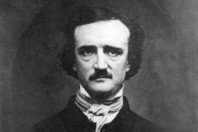Edgar Allan Poe
Entretanto, nem por isso sou menos capaz de definir essa sensação, de analisá-la, ou mesmo de ter dela uma percepção integral. Reconheci-a, repito-o, algumas vezes no aspecto duma vinha rapidamente crescida, na contemplação de uma falena, duma borboleta, duma crisálida, duma corrente de água precipitosa. Senti-a no oceano, na queda dum meteoro. Senti-a nos olhares de pessoas extraordinariamente velhas. E há uma ou duas estrelas no céu (uma especialmente, uma estrela de sexta grandeza dupla e mutável, que se encontra perto da grande estrela da Lira) que, vistas pelo telescópio, me deram aquela sensação. Sentindo-me invadido por ela ao ouvir certos sons de instrumentos de corda e, não poucas vezes, ao ler certos trechos de livros. Entre numerosos outros exemplos, lembro-me de alguma coisa num de Joseph GlanvilI que (talvez simplesmente por causa de sua singularidade, quem sabe lá?) jamais deixou de inspirar-me a mesma sensação: "E ali dentro está a vontade que não morre. Quem conhece os mistérios da vontade, bem como seu vigor? Porque Deus é apenas uma grande vontade, penetrando todas as coisas pela qualidade de sua aplicação. O homem não se submete aos anjos nem se rende inteiramente à morte, a não ser pela fraqueza de débil vontade.
(...) Entretanto, nem por isso sou menos capaz de definir essa sensação, de analisá-la, ou mesmo de ter dela uma percepção integral. Reconheci-a, repito-o, algumas vezes no aspecto duma vinha rapidamente crescida, na contemplação de uma falena, duma borboleta, duma crisálida, duma corrente de água precipitosa. Senti-a no oceano, na queda dum meteoro. Senti-a nos olhares de pessoas extraordinariamente velhas. E há uma ou duas estrelas no céu (uma especialmente, uma estrela de sexta grandeza dupla e mutável, que se encontra perto da grande estrela da Lira) que, vistas pelo telescópio, me deram aquela sensação. Sentindo-me invadido por ela ao ouvir certos sons de instrumentos de corda e, não poucas vezes, ao ler certos trechos de livros. Entre numerosos outros exemplos. (...)
Só
Desde a infância eu tenho sido
Diferente d'outros – tenho visto
D'outro modo – minhas paixões
Tinham uma outra fonte e
Minhas mágoas outra origem -
No mesmo tom não despertava
O meu coração para a alegria -
O que amei – eu amei só.
Então – na infância – a aurora
Da vida atormentada – estava
Em cada nicho de bem e mal
O mistério que me prendia -
Da correnteza, da fonte -
Da escarpas rubras do monte -
Do sol que me rodeava
Em pleno outono dourado -
Do relâmpago nos céus
Quando sobre mim passava -
Do trovão, da tormenta -
E a nuvem tem a forma
(Quando o resto do céu é azul)
D'um demônio aos meus olhos.
Anabel Lee
It was many and many a year ago,
In a kingdom by the sea,
That a maiden there lived whom you may know
By the name of Annabel Lee;
And this maiden she lived with no other thought
Than to love and be loved by me.
I was a child and she was a child,
In this kingdom by the sea;
But we loved with a love that was more than love-
I and my Annabel Lee;
With a love that the winged seraphs of heaven
Coveted her and me.
And this was the reason that, long ago,
In this kingdom by the sea,
A wind blew out of a cloud, chilling
My beautiful Annabel Lee;
So that her highborn kinsman came
And bore her away from me,
To shut her up in a sepulchre
In this kingdom by the sea.
The angels, not half so happy in heaven,
Went envying her and me-
Yes!- that was the reason (as all men know,
In this kingdom by the sea)
That the wind came out of the cloud by night,
Chilling and killing my Annabel Lee.
But our love it was stronger by far than the love
Of those who were older than we-
Of many far wiser than we-
And neither the angels in heaven above,
Nor the demons down under the sea,
Can ever dissever my soul from the soul
Of the beautiful Annabel Lee.
For the moon never beams without bringing me dreams
Of the beautiful Annabel Lee;
And the stars never rise but I feel the bright eyes
Of the beautiful Annabel Lee;
And so, all the night-tide, I lie down by the side
Of my darling- my darling- my life and my bride,
In the sepulchre there by the sea,
In her tomb by the sounding sea.
Experience has shown, and a true philosophy will always show, that a vast, perhaps the larger portion of the truth arises from the seemingly irrelevant.
Alguma coisa no amor sem egoísmo e abnegado de um animal atinge a alma dos que já experimentaram o erro, a fragilidade, a fidelidade de afeição do simples homem.
Um sentimento que era um misto de horror e remorso; mas não passou de um sentimento superficial e equívoco, pois minha alma permaneceu impassível.
Há algo, no amor desinteressado, e capaz de sacrifícios, de um animal, que toca diretamente o coração daqueles que tiveram ocasiões freqüentes de comprovar a amizade mesquinha e a frágil fidelidade de um simples homem.
Talvez, mais tarde, haja alguma inteligência que reduza o meu fantasma a algo comum — uma inteligência mais serena, mais lógica e muito menos excitável do que, a minha, que perceba, nas circunstâncias a que me refiro com terror, nada mais do que uma sucessão comum de causas e efeitos muito naturais.
Creio que a perversidade é um dos impulsos primitivos do coração humano - uma das faculdades, ou sentimentos primários, que dirigem o caráter do homem
Os olhos são as janelas para a alma.
Tornei-me insano, com longos intervalos de uma horrível sanidade.
The Raven
Once upon a midnight dreary, while I pondered weak and weary,
Over many a quaint and curious volume of forgotten lore,
While I nodded, nearly napping, suddenly there came a tapping,
As of some one gently rapping, rapping at my chamber door.
`'Tis some visitor,' I muttered, `tapping at my chamber door -
Only this, and nothing more.'
Ah, distinctly I remember it was in the bleak December,
And each separate dying ember wrought its ghost upon the floor.
Eagerly I wished the morrow; - vainly I had sought to borrow
From my books surcease of sorrow - sorrow for the lost Lenore -
For the rare and radiant maiden whom the angels named Lenore -
Nameless here for evermore.
And the silken sad uncertain rustling of each purple curtain
Thrilled me - filled me with fantastic terrors never felt before;
So that now, to still the beating of my heart, I stood repeating
`'Tis some visitor entreating entrance at my chamber door -
Some late visitor entreating entrance at my chamber door; -
This it is, and nothing more,'
Presently my soul grew stronger; hesitating then no longer,
`Sir,' said I, `or Madam, truly your forgiveness I implore;
But the fact is I was napping, and so gently you came rapping,
And so faintly you came tapping, tapping at my chamber door,
That I scarce was sure I heard you' - here I opened wide the door; -
Darkness there, and nothing more.
Deep into that darkness peering, long I stood there wondering, fearing,
Doubting, dreaming dreams no mortal ever dared to dream before;
But the silence was unbroken, and the darkness gave no token,
And the only word there spoken was the whispered word, `Lenore!'
This I whispered, and an echo murmured back the word, `Lenore!'
Merely this and nothing more.
Back into the chamber turning, all my soul within me burning,
Soon again I heard a tapping somewhat louder than before.
`Surely,' said I, `surely that is something at my window lattice;
Let me see then, what thereat is, and this mystery explore -
Let my heart be still a moment and this mystery explore; -
'Tis the wind and nothing more!'
Open here I flung the shutter, when, with many a flirt and flutter,
In there stepped a stately raven of the saintly days of yore.
Not the least obeisance made he; not a minute stopped or stayed he;
But, with mien of lord or lady, perched above my chamber door -
Perched upon a bust of Pallas just above my chamber door -
Perched, and sat, and nothing more.
Then this ebony bird beguiling my sad fancy into smiling,
By the grave and stern decorum of the countenance it wore,
`Though thy crest be shorn and shaven, thou,' I said, `art sure no craven.
Ghastly grim and ancient raven wandering from the nightly shore -
Tell me what thy lordly name is on the Night's Plutonian shore!'
Quoth the raven, `Nevermore.'
Much I marvelled this ungainly fowl to hear discourse so plainly,
Though its answer little meaning - little relevancy bore;
For we cannot help agreeing that no living human being
Ever yet was blessed with seeing bird above his chamber door -
Bird or beast above the sculptured bust above his chamber door,
With such name as `Nevermore.'
But the raven, sitting lonely on the placid bust, spoke only,
That one word, as if his soul in that one word he did outpour.
Nothing further then he uttered - not a feather then he fluttered -
Till I scarcely more than muttered `Other friends have flown before -
On the morrow he will leave me, as my hopes have flown before.'
Then the bird said, `Nevermore.'
Startled at the stillness broken by reply so aptly spoken,
`Doubtless,' said I, `what it utters is its only stock and store,
Caught from some unhappy master whom unmerciful disaster
Followed fast and followed faster till his songs one burden bore -
Till the dirges of his hope that melancholy burden bore
Of "Never-nevermore."'
But the raven still beguiling all my sad soul into smiling,
Straight I wheeled a cushioned seat in front of bird and bust and door;
Then, upon the velvet sinking, I betook myself to linking
Fancy unto fancy, thinking what this ominous bird of yore -
What this grim, ungainly, ghastly, gaunt, and ominous bird of yore
Meant in croaking `Nevermore.'
This I sat engaged in guessing, but no syllable expressing
To the fowl whose fiery eyes now burned into my bosom's core;
This and more I sat divining, with my head at ease reclining
On the cushion's velvet lining that the lamp-light gloated o'er,
But whose velvet violet lining with the lamp-light gloating o'er,
She shall press, ah, nevermore!
Then, methought, the air grew denser, perfumed from an unseen censer
Swung by Seraphim whose foot-falls tinkled on the tufted floor.
`Wretch,' I cried, `thy God hath lent thee - by these angels he has sent thee
Respite - respite and nepenthe from thy memories of Lenore!
Quaff, oh quaff this kind nepenthe, and forget this lost Lenore!'
Quoth the raven, `Nevermore.'
`Prophet!' said I, `thing of evil! - prophet still, if bird or devil! -
Whether tempter sent, or whether tempest tossed thee here ashore,
Desolate yet all undaunted, on this desert land enchanted -
On this home by horror haunted - tell me truly, I implore -
Is there - is there balm in Gilead? - tell me - tell me, I implore!'
Quoth the raven, `Nevermore.'
`Prophet!' said I, `thing of evil! - prophet still, if bird or devil!
By that Heaven that bends above us - by that God we both adore -
Tell this soul with sorrow laden if, within the distant Aidenn,
It shall clasp a sainted maiden whom the angels named Lenore -
Clasp a rare and radiant maiden, whom the angels named Lenore?'
Quoth the raven, `Nevermore.'
`Be that word our sign of parting, bird or fiend!' I shrieked upstarting -
`Get thee back into the tempest and the Night's Plutonian shore!
Leave no black plume as a token of that lie thy soul hath spoken!
Leave my loneliness unbroken! - quit the bust above my door!
Take thy beak from out my heart, and take thy form from off my door!'
Quoth the raven, `Nevermore.'
And the raven, never flitting, still is sitting, still is sitting
On the pallid bust of Pallas just above my chamber door;
And his eyes have all the seeming of a demon's that is dreaming,
And the lamp-light o'er him streaming throws his shadow on the floor;
And my soul from out that shadow that lies floating on the floor
Shall be lifted - nevermore!
SONHO DENTRO DE UM SONHO
Aceita este beijo acima do sobrolho!
E ao me separar de ti agora,
Deixa-me confessar isto
Não será errado admitir
Que os meus dias têm sido um sonho;
Contudo se a sorte fugiu
Numa noite ou num dia,
Numa visão ou em nenhuma,
Terá então desaparecido?
Tudo o que vemos ou parecemos
Não é mais do que um sonho dentro de um sonho...
SONHO DENTRO DE UM SONHO
Receba este beijo sobre a testa!
E, te deixando a partir de agora,
Então, deixe-me te contar:
Você não está errado, você que considera
Que meus dias foram um sonho;
Mesmo que a Esperança tenha sumido
Em uma noite, ou em um dia,
Numa visão ou em nada mais,
É, portanto, o que menos se perdeu?
Tudo o que vemos ou transparecemos
É nada além de um sonho dentro de um sonho.
Permaneço no meio do rugido
De uma onda agitada a “quebrar”,
E seguro dentro de minha mão
Grãos da areia dourada -
Quão poucos!! Ainda, enquanto eles escorrem
Por entre meus dedos, lá para o fundo [da água],
Como eu lamento, como eu lamento!!
Ó, Deus! Não posso agarrá-los
Com um cinto apertado?
Ó, Deus! Não posso guardar nenhum deles
Da onda impiedosa [do Tempo]???
Tudo que vemos ou transparecemos,
Não é mais que um sonho dentro de um sonho??
(In "Histórias Extraordinárias" de Edgar Allan Poe)
Receba este beijo sobre a testa!
E, te deixando a partir de agora,
Então, deixe-me te contar:
Você não está errado, você que considera
Que meus dias foram um sonho;
Mesmo que a Esperança tenha sumido
Em uma noite, ou em um dia,
Numa visão ou em nada mais,
É, portanto, o que menos se perdeu?
Tudo o que vemos ou transparecemos
É nada além de um sonho dentro de um sonho.




